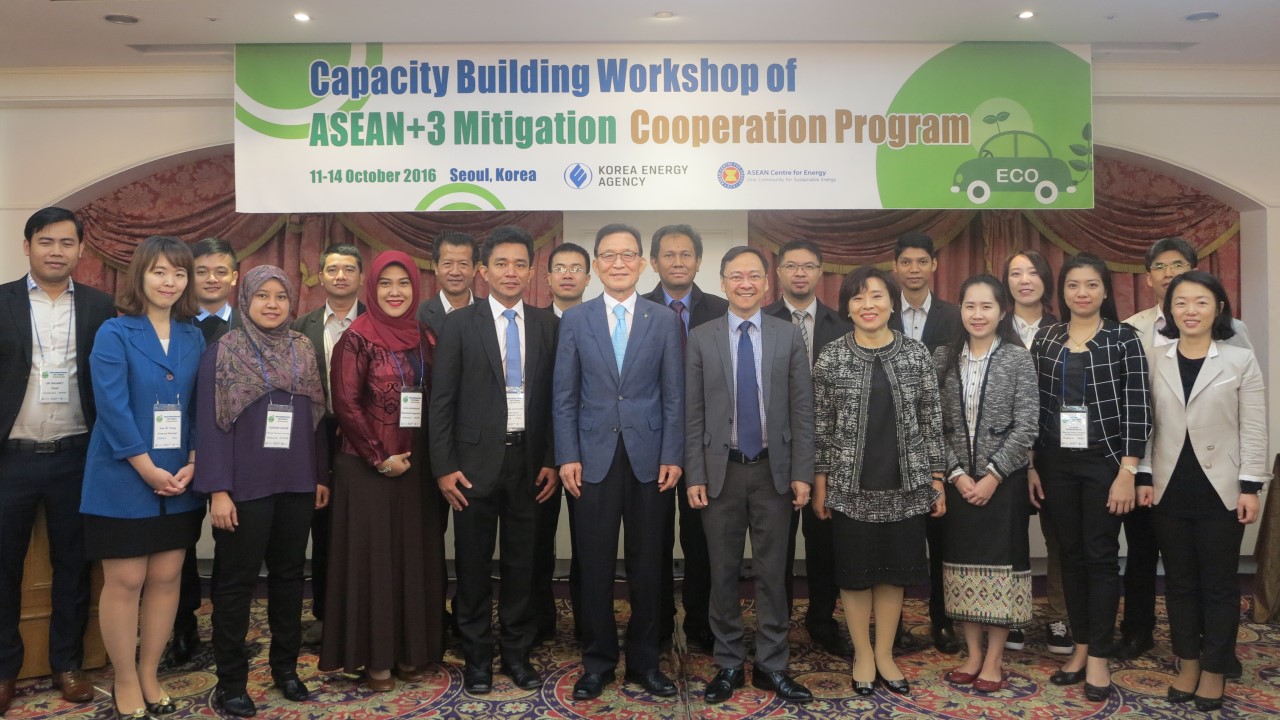Menu

The ASEAN Centre for Energy (ACE) and Korea Energy Agency (KEA) jointly organised the ASEAN+3 Mitigation Cooperation Programme Workshop in Seoul, Korea on 11-14 October 2016. The Workshop was participated by 20 delegates from Cambodia, Indonesia, Lao PDR, Malaysia, Myanmar, Thailand, Vietnam, KEA and ACE.
KEA and ACE have been cooperating on greenhouse gas (GHG) mitigation in the ASEAN region since 2009. This workshop specifically serves as an exchange information forum between Korea and the ASEAN Member States (AMS) on GHG mitigation in the transportation sector. This workshop focused on sharing Korean transportation energy efficiency (EE) policies and technologies to the AMS. In terms of regional cooperation, vehicle fuel efficiency is the least explored sector under the energy efficiency and conservation (EE&C) programme of the ASEAN Plan of Action for Energy Cooperation 2016-2025. However, the conduct of a feasibility study on EE&C in the transport sector is being considered. Under the Kuala Lumpur Transport Strategic Plan 2016-2025, sustainable transport is prominently featured to initiate and support the development and implementation of fuel economy policies and standard, as well as policies towards cleaner fuels, vehicles and vessels.
In each AMS, information on the progress of vehicle fuel efficiency is at the nascent stage of development and many gaps remain. A regional policy and roadmap on vehicle fuel efficiency is important to support closing these gaps. However, an increasingly harmonised approaches across countries is a challenge. Apart from that, fuel economy is a cross-sectoral topic involving energy and transport, as well as ministries of trade, finance and environment, and thus requires inter-ministerial coordination. It is noted that there is a lack of clear ownership of the issue within AMS, and is often a barrier for catalysed action. At the ASEAN level, energy and transport bodies need to coordinate and synchronise action plans for greater connectivity and integration. In this workshop, Korea’s advanced transportation EE policies were introduced, such as vehicle EE standard and labelling, eco-friendly vehicle supporting policy, tire efficiency standards and ratings, electric vehicle deployment policy, and electric vehicle battery-leasing programme.
As part of the Workshop, KEA organised a visit to the Korea Automotive Technology Institute (KATECH), an institution for testing vehicles’ and tires’ EE, to enhance the participants understanding on how the Korean government’s policies have been implemented in the field. Towards the end of the Workshop, the AMS participants suggested possible areas of cooperation in 2017 such as the implementation of transportation management system focusing on reducing fuel consumption and increasing logistics efficiency; as well as promotion of high EE industrial equipment (e.g: boilers, pressure vessels & electric model) and energy management system for factory to reduce energy consumption in industrial sector as part of the efforts to mitigate GHG emission. For 2018, the participants suggested to KEA and ACE to consider organising a high-level policy consultation on EE&C, and information sharing forum on smart grids and infrastructure technologies for fuel economy and electric vehicles in ASEAN. (CGZ, Photo credit: KEA)
